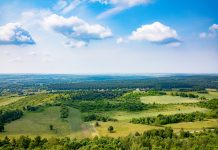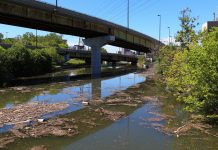Climate Service Center Germany (GERICS) contributes to increasing the evidence base on Nature-Based Solutions by taking part in two Horizon 2020 projects, NAIAD and OPERANDUM, as we find out here
Climate change, as well as ongoing environmental degradation, are exacerbating societal challenges, such as water and food security, poverty, or human health. At the same time, society is becoming increasingly aware of the value of nature in supporting human well-being. These facts boosted the development of new approaches which highlight the role of natural processes for tackling socio-environmental challenges. One of these approaches is the concept of Nature-Based Solutions – NBS. Nature-Based Solutions are solutions to societal challenges that are inspired and supported by nature (Raymond et al, 2017). According to many definitions of Nature-Based Solutions, a common goal of their application is to find a balance between social, environmental, economic objectives and even long-term sustainability.
The creation of floodplains is an exemplary Nature-Based Solution. By giving more space to a river at targeted points, water levels at vulnerable points are less high. An alternative conventional so-called grey measure is to raise dykes for flood protection. In respect to the social challenge of optimal water quality and food security, adopting agricultural practices, such as crop rotation can improve water infiltration, as well as increase the harvest.
Nature-Based Solutions often draw on traditional, well-established practices. Further, the ability to address societal challenges in a variety of ways and to comprise co-benefits is nature of Nature-Based Solutions. This is an advantage of Nature-Based Solutions over many conventional approaches. The concept is progressively gaining importance in the European Union policy agenda. Nature-Based Solutions are an innovative way of adapting to environmental change, shifting to a greener economy and a more sustainable society and even creating new jobs. However, evidence on the cost-effectiveness of Nature-Based Solutions in the long-term is still scarce. For this reason, the European Commission is investing in a series of projects aiming to strengthen the evidence base on Nature-Based Solutions in the context of its Horizon 2020 Framework Programme. The Climate Service Center Germany (GERICS) is currently taking part in two of these projects, NAIAD (Nature Insurance value: Assessment and Demonstration) and OPERANDUM (OPEn-air laboRAtories for Nature baseD solUtions to reduce hydro-meteorological risks).
NAIAD aims to internalise the insurance value of ecosystems in risk management practice and agendas. The assumption is that Nature-Based Solutions can reduce the vulnerability to climate-induced hazards, especially droughts and flooding. The resulting risk reduction can be assessed and incorporated within insurance schemes. NAIAD aims to develop concrete Nature-Based Solutions at nine demo sites across Europe focusing on droughts and floods within catchments in a source to sea continuum. The NAIAD project partners develop and test – with key insurers and municipalities – the concepts, tools, applications and necessary instruments for mainstreaming Nature-Based Solutions.
In order to enable the interactive exchange of information, GERICS applies an integrative participative modelling approach within NAIAD. It considers the needs of local stakeholders from the fields of insurance, nature conservation and regional planners, as well as the approaches of interdisciplinary groups from the natural and social sciences. Participative processes and group modelling techniques are the basis for the development of quantitative system dynamic models. These system dynamic models combine physical, socio-economic, as well as climate data and allow to model the socio-economic consequences of the implementation of Nature-Based Solutions. System dynamic models help to improve the understanding of systemic processes and, therefore, support decision-makers in their actions.
The second project, GERICS is involved, is OPERANDUM. This project aims to deliver tools and methodologies for the validation of Nature-Based Solutions in order to enhance resilience in European rural and natural territories by reducing hydro-meteorological risks. One of the objectives is to provide science-evidence for the usability of Nature-Based Solutions and best practices for their design, based on participatory processes. Therefore, the project expands the concept of Living Labs to a broader vision for natural and rural areas. In seven European countries and a further three in China and Australia, Nature-Based Solutions for coping with hydro-meteorological risks are being developed and implemented in so-called open-air laboratories. Assessing the effectiveness of these Nature-Based Solutions through innovative monitoring systems and state-of-the-art numerical modelling approaches is a further objective in OPERANDUM.
GERICS is involved in the German open-air laboratory, which is represented by the biosphere reserve “Niedersächsische Elbtalaue”, close to Hamburg. Flood protection is of great importance in the biosphere reserve. A Nature-Based Solution to cope with flood risks is nature-based floodplain management. GERICS investigates different Nature-Based Solutions for this region with regards to their local transferability and efficiency under changed climatic conditions.
To ensure a sustainable and long-term efficiency of the Nature-Based Solutions for all open-air laboratories, GERICS supports the co-design development of Nature-Based Solutions with the provision of user-oriented processed regional climate information.
Nature-Based Solutions is still a concept that needs more acceptance at the global governance level, as well as at the landscape planning level in rural and urban areas. Both projects aim to improve the acceptance of Nature-Based Solutions by integrating knowledge about the Nature-Based Solutions efficacy against hydro-meteorological risks. There is no single Nature-Based Solution addressing all challenges. Each time a solution needs to be designed to address the relevant challenges in its local context and its respective community.
For the design of Nature-Based Solutions, an understanding of site conditions, including local information about future climate changes, is essential. To improve the understanding of the local systemic processes, GERICS applies a participative modelling approach. GERICS also facilitates to appropriately account for climate change information by providing science-based and user-tailored processed climate change information for local to regional scale of Nature-Based Solutions. With these approaches, GERICS helps to ensure the long-term efficiency of Nature-Based Solutions and contributes to increasing the evidence base on Nature-Based Solution.
Authors and Contact (alphabetic order)
Juliane El Zohbi (juliane.el_zohbi@hzg.de)
Eulalia Gomez (eulalia.gomez@hzg.de)
Swantje Preuschmann (swantje.preuschmann@hzg.de)
References
Raymond, C.M., Berry, P., Breil, M., Nita, M.R., Kabisch, N., de Bel, M., Enzi, V., Frantzeskaki, N., Geneletti, D., Cardinaletti, M., Lovinger, L., Basnou, C.,Monteiro, A., Robrecht, H., Sgrigna, G., Munari, L. and Calfapietra, C. (2017) An Impact Evaluation Framework to Support Planning and Evaluation of Nature-based Solutions Projects. Report prepared by the EKLIPSE Expert Working Group on Nature-based Solutions to Promote Climate Resilience in Urban Areas.
Please note: This is a commercial profile
Prof Dr Daniela Jacob
Climate Service Center Germany (GERICS)











